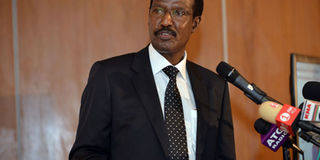Ministry seeks more power suppliers

Kenya Power Managing Director Ben Chumo speaks during a media briefing at Intercontinental Hotel in Nairobi on October 24, 2014. Kenya Power may no longer enjoy monopoly of selling electricity to people living in remote areas, if a proposal by the Ministry of Energy and Petroleum is adopted. FILE PHOTO | SALATON NJAU | NATION MEDIA GROUP
What you need to know:
- The ministry is seeking consultancy services to develop a framework that will guide engagement of the private sector in power distribution in areas that are outside the national grid.
- According to a renewable energy investment plan prepared by the ministry, the country has the potential for about 50 more mini-grids which are targeted to handle power generated from renewable sources such as wind and solar.
Kenya Power may no longer enjoy monopoly of selling electricity to people living in remote areas, if a proposal by the Ministry of Energy and Petroleum is adopted.
The ministry is seeking consultancy services to develop a framework that will guide engagement of the private sector in power distribution in areas that are outside the national grid.
The winner is expected to guide in development of regulations, revenue arrangements and technical requirements to set up mini grids that will be operated by the private sector.
“The Ministry of Energy is thus seeking to procure a short-term consultancy to recommend business models for the private sector engagement in renewable energy hybrid mini grids,” reads a tender notice.
The mini-grid concept is meant to allow independent power producers to sell electricity to private institutions who in turn sell to consumers.
The Energy ministry estimates that the small networks are likely to serve rural communities, households, public sector facilities and businesses totalling to between 200 to 3,000 connections.
22 MINI-GRIDS
There are about 22 mini-grids currently in operation countrywide which are run by Kenya Power and the Rural Electrification Authority.
According to a renewable energy investment plan prepared by the ministry, the country has the potential for about 50 more mini-grids which are targeted to handle power generated from renewable sources such as wind and solar.
The project to incorporate private players has been funded by the World Bank under the Kenya Electricity Expansion Programme.
A consultant is also expected to advise the government on whether to shift from a uniform tariff policy that is currently applied countrywide.
The government is seeking advice on development of a regulatory framework that will anchor power purchase agreements that will be signed between independent producers and private electricity distributors.
Only about 32 per cent of the country’s population has access to electricity.
The situation has been blamed on high initial cost of connection and lack of adequate investment by the government to expand the existing network.
In May, American conglomerate General Electric announced that it would award $100,000 (Sh8.9 million) each to 25 institutions from six countries, including Kenya, to implement projects that seek to develop cheap power from renewable sources.




